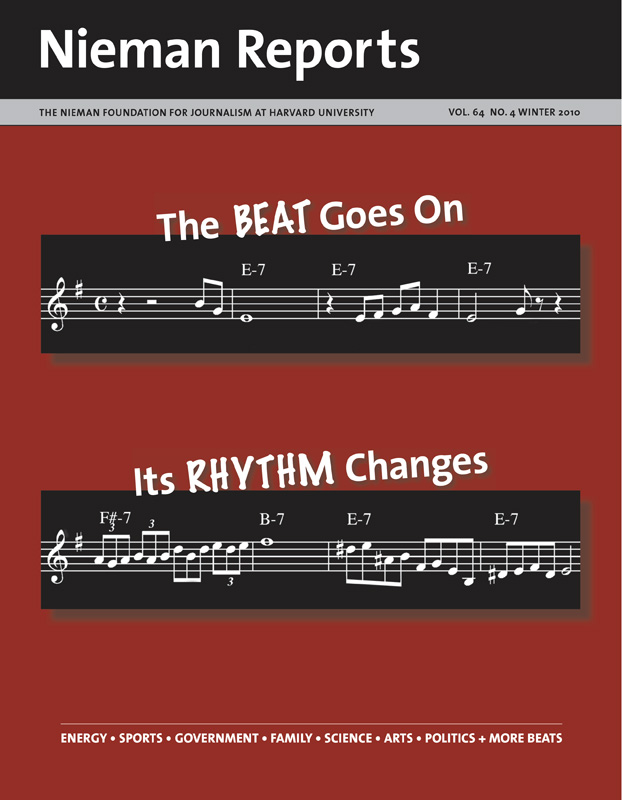
American newspapers have sharply reduced coverage of the arts while the number of blogs covering this beat is on the rise.
Like most reporters, theater critics are not generally accused of being discreet. Granted, most of us don’t actually use those notorious pens that light up in the dark. But we’re still sitting there, scratching away on our reporters’ notebooks, while audience members all around us are trying to concentrate on the play.
As a shy person, I used to cringe at intermission when people asked me, “Why are you taking notes?”
Now I dislike it even more—because I don’t know what to say.
In February I quit my job after more than 26 years as the Orlando Sentinel’s theater critic. Used to be I had an answer when people asked me what I did. Now I’m not so sure.
As a refugee from daily newspapering, I’m one of thousands of arts journalists who in the past couple of years have found themselves footloose. Douglas McLennan, the founder and editor of ArtsJournal.com (and himself a former classical music critic for the Seattle Post-Intelligencer) estimates that in 2005 there may have been about 5,000 people covering various arts beats for American newspapers—critics, feature writers, cultural news reporters, and many who did all three.
Now, because of layoffs, cutbacks and the death of several major newspapers, McLennan says, that number has been cut in half. And that’s a radical reduction, even in an industry that, according to the American Society of Newspaper Editors, has lost more than one newsroom job in four since 2001. Even if arts journalists were not specifically targeted—and the nature of buyouts may mean that they weren’t—half of all arts staff positions is still a pretty big bite.
Arts journalists have watched in wonder as the carnage has taken place. In 2007 The Atlanta Journal-Constitution eliminated many of its critics’ jobs; four more of its arts writers took buyouts in 2009. Earlier this year Variety laid off four arts writers, including its chief film and theater critics. Movie critics have lost their jobs in Tampa, Fort Lauderdale, Dallas and Denver, among other cities, and their copy has been replaced by wire. This summer the Orange County Register eliminated its highly regarded Arts Blog and reassigned its classical music critic and reporter to the celebrity beat.
My own circle of theater-critic friends has been caught in the same wave. In the past few years senior theater critics have taken buyouts at the (Newark) Star-Ledger, the Milwaukee Journal Sentinel, the Detroit Free Press, the Pittsburgh Post-Gazette, and The San Diego Union-Tribune. Others have left newspapers to take on more secure jobs outside journalism.
And my former colleagues at the Orlando Sentinel have felt their share of the turbulence—the TV critic reassigned to blog about media, celebrities and crime; the pop music critic split between music and a Florida travel column; the movie critic reduced to reviewing only the films that aren’t covered by a sister paper, the Chicago Tribune.
Changing Notions
I was lucky, mostly. For most of my 26 years, three months, two weeks, and six days at the Sentinel, I was privileged to do exactly what I wanted to do—to write in depth about theater both local and national, to review plays, and to build bridges between theater companies and the audiences they serve. I loved using the process of writing to figure out what I thought and felt, and I loved being a conduit to readers for that feeling. I loved the fact that the more light I was able to shed on theater in the Orlando area, the stronger it grew.
My job felt like a partnership between me, the theaters, and the audience, and all of us blossomed along the way.
Over the past few years, though, that situation changed. A couple of new editors had less interest in reviews. I was reassigned half-time to write news stories about arts groups as institutions; most of those stories were about budgets, not about art. I was expected to count how many of my stories were about the so-called “business of the arts” and how many about theater, and I had to make sure the latter never took the majority of my time.
A sympathetic arts editor shielded me. But when she quit (to take a less anxiety-producing job outside daily newspapers), the stresses of what has happened to newspapering got the best of me. I was sad about the failing state of journalism. I was sad about the direction of the Sentinel. I was sad that I no longer was allowed to do what I loved to do.
Others have written (a lot) about why all this has happened. Many blame the Internet, and certainly the rise of the Internet has made new critical voices easier to hear. In the old days of print supremacy, a medium-sized city like Orlando, Florida would have had a theater critic at the daily newspaper and a couple of freelance critics at an alternative weekly. Nowadays the same city might still have somebody writing about theater at the daily paper (although that person is much more likely to be a freelancer), and the alternative paper still manages to pay a critic or two. But the rise of bloggers means that any performance I go to in Orlando is likely to have four or five reviewers sitting in the audience, and most of those people have been vetted for credentials by nobody but themselves.
Many audience members don’t know or care about the difference, and that’s a key point. Today, in America, we’re schooled to believe that one person’s opinion is just as good as another’s. That’s democracy in action, many people think, and they’re tone-deaf to the differences between someone who’s dashing off a personal opinion and someone who has spent years seeing, listening to, studying and writing about a particular form of art.
We also live in a society in which “elite” and “intellectual” have become dirty words. Many newspaper editors seem to have fallen for the idea that covering NASCAR is egalitarian but covering a gallery opening is not. In its rush to embrace whatever sells, the newspaper industry has jumped on the back of celebrity culture, and covering Lindsay Lohan’s latest bust—or a sordid and perennial child-murder case here in Orlando—has been judged to sell papers.
Newspapers no longer lead; they follow wherever a fickle public decides to go. And they follow the advertising bucks, even if editors say that advertising and editorial do not mix. Sports sections get plenty of advertising money. Automobile sections and travel sections still exist largely because they are backed by the car and travel industries. Arts sections suffer because many or most local arts groups are nonprofits, and they had little money for ads even before the economy turned sour.
Filling the Void
So does any of this matter, except to those of us who are no longer doing the jobs we loved? In the short term, yes—especially to arts groups and the audiences they are trying to reach. Older people, especially, often have no access to the Internet, and they still make up a large percentage of the audience for the arts. Almost every time I go to a play, an art opening, or a cocktail party, an elderly arts lover approaches me and talks about how she misses what I used to do.
And arts organizations are scrambling to figure out how to get the word out in cities where newspaper criticism has all but died. Many groups have used mass e-mails to their advantage, jumped on the Facebook bandwagon, and reveled in the fact that there’s now no gatekeeper between them and the ticket buyer. Others, especially smaller, less sophisticated groups, have struggled to get their word out and to find people to fill their seats.
At the same time, though, intelligent Internet journalists are taking up the slack, at least in some cities. In south Florida, Lawrence A. Johnson, the former classical music critic for The Miami Herald, started South Florida Classical Review in 2008 after the region’s three major dailies reduced their coverage. Now it has a sister site, South Florida Theater Review, whose lead critic, Bill Hirschman, came from the (South Florida) Sun-Sentinel.
Other similar websites exist for theater, books, art, dance and other kinds of music, and more are springing up all the time. Yet many of those sites don’t pay their writers, and most struggle to make ends meet. In many cities, especially smaller ones, substantive blogging has not sprung up to replace what has been lost.
As for me, after I quit the Sentinel I felt both grief and emancipation. Actually, I had been grieving for the state of journalism for a couple of years so deciding to leave mainly filled me with relief. I sleep better. I eat better. I write on the back porch and listen to the squirrels taunt my cats.
I have scaled back some grand plans to start an arts blog to cover everything artistic that moves in central Florida. Instead, I review plays and cover theater news for my own website and am gratified when theater people refer to me favorably. When somebody called me “Orlando’s critic of record,” I was thrilled.
I have no problem filling my time. But I still worry how to answer when somebody turns to me at intermission and asks why I’m taking notes.
“I have a blog,” I say.
Yeah, me and 96,000 other people—give or take a few million.
Elizabeth Maupin left her job earlier this year after 26 years as the Orlando Sentinel’s theater critic. Her blog—Orlandotheater.com—is where she now writes about theater.


